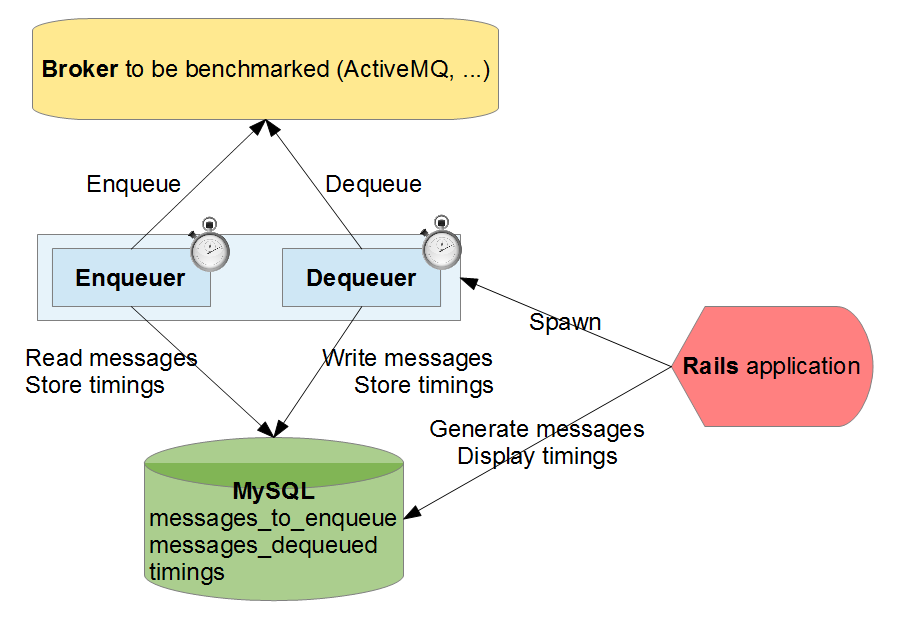谁才是最快的消息队列:ActiveMQ, RabbitMQ, HornetQ, QPID
来源:互联网 发布:药品数据库 编辑:程序博客网 时间:2024/06/06 17:12
Y坐标是处理时间,越低表示性能越好.
Lately I performed a message queue benchmark, comparing several queuing frameworks (RabbitMQ, ActiveMQ…).
Those benchmarks are part of a complete study conducted by Adina Mihailescu, and everything was presented at the April 2013 riviera.rb meet-up. You should definitely peek into Adina’s great presentation available online right here.Setup and scenarios
So I wanted to benchmark brokers, using different protocols: I decided to build a littleRails application piloting a binary that was able to enqueue/dequeue items taken from a MySQL database.

I considered the following scenarios:
Scenario A: Enqueuing 20,000 messages of 1024 bytes each, then dequeuing them afterwards.
Scenario B: Enqueuing and dequeuing simultaneously 20,000 messages of1024 bytes each.
Scenario C: Enqueuing and dequeuing simultaneously 200,000 messages of32 bytes each.
Scenario D: Enqueuing and dequeuing simultaneously 200 messages of32768 bytes each.
For each scenario, 1 process is dedicated to enqueuing, and another one is dedicated to dequeuing.
I measured the time spent by each enqueuing and dequeuing process, with 2 different broker configurations:
Using persistent queues and messages (when the broker is down and back up, queues are still containing items).
Using transient queues and messages (no persistence: when broker is down, queues and items are lost).
I decided to bench the following brokers:
ActiveMQ 5.8.0 with STOMP protocol
RabbitMQ 3.0.2 with STOMP and AMQP protocols
HornetQ 2.3.0 with STOMP protocol
Apollo 1.6 with STOMP protocol
QPID 0.20 (Java broker) with AMQP protocol
A home-made ZeroMQ 2.2.0 broker, working in memory only (no persistence).
The tests were run on a single laptop with this configuration:
Model: Dell Studio 1749
CPU: Intel Core i3 @ 2.40 GHz
RAM: 4 Gb
OS: Windows 7 64 bits
Ruby 1.9.3p392
Java 1.7.0_17-b02
Ruby AMQP client gem: amqp 0.9.10
Ruby STOMP client gem: stomp 1.2.8
Ruby ZeroMQ gem: ffi-rzmq 1.0.0
Apart from declaring the testing queues in some brokers’ configuration and the persistence settings,all brokers were running with their default configuration out of the box (no tuning made).
You can find all the source code used to perform those benchmarkshere on github.
Results
And now, the results (processing time measured in seconds: the lower the better).
Scenario A

Scenario B

Scenario C

Scenario D

Here are the results data sheet for those who are interested: Benchmarks
What can we say about it?
The benchmark setup being simple (just 1 host, using dedicated queues with 1 enqueuer and 1 dequeuer each, no special performance or configuration tuning), theresults will just give us a first estimation of performance. More complex scenarios will need more complex setups to draw final thoughts.
However a few trends seem to appear:
Brokers perform much better with bigger messages. Therefore if your queuing clients can support grouping their messages, this is a win. However grouped messages could not be spread across parallel consumers.
Persistence drawbacks (disk or db accesses) appear when brokers deal with big messages (except for QPID which is very efficient for transient messages whatever the size). This means that for small and medium messages,time is spent on processing rather than on I/O.
ZeroMQ broker outperforms all others. This means that unless you have a need for complex broker features,ZeroMQ is a perfect message dispatcher among processes.
QPID seems to be the best at performing without persistence.
It seems AMQP protocol is much more optimized than STOMP (at least judging with RabbitMQ’s results). However this might be due to a badly coded Ruby STOMP client, or a badly coded STOMP implementation on RabbitMQ’s side.
HornetQ seems bad at dealing with small and medium messages, compared to others.
Except for big messages, RabbitMQ seems to be the best bet as it outperforms others by a factor of 3.
forwarded from http://my.oschina.net/zookeeper/blog/186667
- 谁才是最快的消息队列:ActiveMQ, RabbitMQ, HornetQ, QPID
- 最快队列ActiveMQ, RabbitMQ, HornetQ, QPID
- A quick message queue benchmark: ActiveMQ, RabbitMQ, HornetQ, QPID, Apollo
- A quick message queue benchmark: ActiveMQ, RabbitMQ, HornetQ, QPID, Apollo
- 消息队列RabbitMQ和ActiveMQ的生产者流量控制
- 消息队列RabbitMQ和ActiveMQ的生产者流量控制
- 消息队列RabbitMQ和ActiveMQ的生产者流量控制
- 消息队列RabbitMQ和ActiveMQ的生产者流量控制
- 消息队列与 ActiveMQ, RabbitMQ,ZeroMQ 等
- RabbitMQ vs Apache ActiveMQ vs Apache qpid
- 关于消息队列的使用----ActiveMQ,RabbitMQ,ZeroMQ,Kafka,MetaMQ,RocketMQ
- 关于消息队列的使用----ActiveMQ,RabbitMQ,ZeroMQ,Kafka,MetaMQ,RocketMQ
- 关于消息队列的使用----ActiveMQ,RabbitMQ,ZeroMQ,Kafka,MetaMQ,RocketMQ
- 关于消息队列的使用----ActiveMQ,RabbitMQ,ZeroMQ,Kafka,MetaMQ,RocketMQ
- 关于消息队列的使用----ActiveMQ,RabbitMQ,ZeroMQ,Kafka,MetaMQ,RocketMQ
- 【中间件】消息队列(一):RabbitMQ、ActiveMQ、Kafka和Redis
- ActiveMQ、RabbitMQ与ZeroMQ等消息队列性能对比
- 消息队列RabbitMQ的安装
- JS常见异常类型以及捕获异常
- 说说iOS与内存管理(上)
- 从此SQLPLUS有了Top命令
- Storm 配置图文解析
- AD域 技術整理
- 谁才是最快的消息队列:ActiveMQ, RabbitMQ, HornetQ, QPID
- uc/os-ii任务与任务管理
- LeetCode_71---Simplify Path
- leetcode[28]:Implement strStr()
- apt在线/离线安装CDH5.1.2
- 辛星浅析php正则匹配中的utf字符串
- MYSQL学习2数据库-表-字段
- MCU GPIO模拟spi
- centos killall安装


